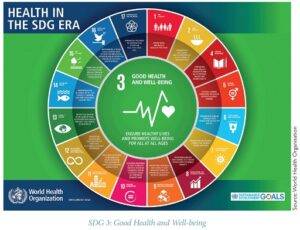The COVID-19 pandemic has reshaped the world, impacting health, economies, and societies on a global scale. As nations grappled with unprecedented challenges, the virus, caused by the novel coronavirus SARS-CoV-2, surged, bringing about a complex global health emergency that demanded swift and adaptable responses.
The Origins of COVID-19
- Viral Emergence: COVID-19 emerged in late 2019 in Wuhan, China, initially as a cluster of pneumonia cases.
- Zoonotic Transmission: The virus is believed to have zoonotic origins, likely jumping from an animal host to humans in a seafood market.
- Global Spread: Rapid human-to-human transmission led to a worldwide spread, eventually labeled a pandemic by the World Health Organization (WHO).
Impact on Global Health

The pandemic presented unprecedented challenges to public health systems worldwide, highlighting disparities and vulnerabilities:
- Overwhelmed Healthcare Systems: Hospitals faced immense pressure due to surging cases, causing strains on resources and healthcare personnel.
- Mental Health Implications: Lockdowns and social distancing measures led to increased mental health issues and psychological distress.
- Vaccination Campaigns: Vaccines were developed at an unprecedented speed, leading to mass vaccination campaigns to curb the spread.
Economic and Social Ramifications
The economic and social consequences of COVID-19 have been profound:
- Job Losses and Economic Downturn: Many industries faced shutdowns and job losses, causing financial strain for individuals and businesses.
- Educational Disruption: Schools and universities shifted to remote learning, impacting education and student well-being.
- Technological Advancements: The pandemic accelerated digital transformations, influencing remote work and e-commerce.
Strategies for Mitigation
Adopting effective strategies has been crucial in managing the impact of the pandemic:
- Vaccination Campaigns: Encouraging and facilitating widespread vaccination efforts to achieve herd immunity and reduce transmission rates.
- Public Health Measures: Implementing and adhering to measures such as mask-wearing, social distancing, and hand hygiene to limit the spread of the virus.
- Global Cooperation: Collaboration among nations and organizations for equitable vaccine distribution and sharing of resources and knowledge.
Looking Ahead
As the world navigates the ongoing effects of COVID-19, there are lessons to be learned:
- Preparedness for Future Pandemics: Strengthening global preparedness and response mechanisms for potential future health crises.
- Resilience and Adaptability: Building resilient systems and communities capable of adapting to unforeseen challenges.
- Health Equity: Addressing health disparities and ensuring equitable access to healthcare for all.
The COVID-19 global health emergency has been a pivotal moment in human history, underscoring the importance of collective action, adaptability, and innovation in the face of unforeseen challenges. It is through concerted efforts and cooperation that the world can emerge stronger and more prepared for the future.


